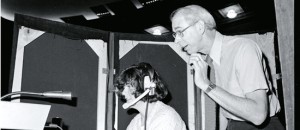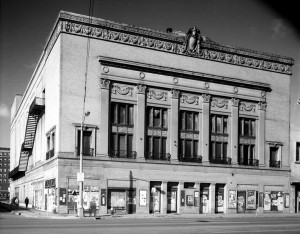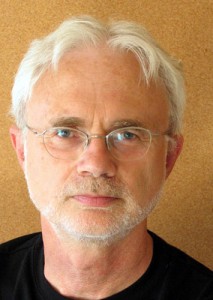I wanted to share with you John Adams's commencement address at Juilliard. All of the text and pictures (except the one of him) come from his very interesting website. The first paragraph -- in quotes -- is from near the end of the speech. I placed it at the top for emphasis.
Juilliard Commencement Address
'...don’t ever feel that what you’re doing in this attention-deficit disorder country of ours is marginal or unimportant. You are in fact the heart and the soul of its very being.'
I have to say that being a composer invited into a public gathering is always an anxiety-producing experience. No matter how casual or at ease we composers may appear on the outside, there is always that little homunculus sitting on our shoulders, muttering cryptic and often insulting remarks and reminding us that, no matter how much we’ve composed or now matter how grand the honor we may be receiving, “you’ll never be as good as Bach.”

Things have loosened up and changed in a very positive way for composers in the years since I was in school. Back then, when I first started going to concerts, a “distinguished” composer in the audience was relatively easy to identify. You just looked for a very serious middle-aged person, usually male, and usually resembling a college math professor who had misplaced his glasses. He would be the one who had been born on a bad hair day and who wore a wrinkled shirt that hadn’t known an iron in several years. He would be the one who composed using a hardware device called a “pencil” and who carried around his latest composition, probably titled “Confrontations Four” for soprano, double bass, piano and magnetic tape in a well-worn oversized briefcase.

Nowadays composers look decidedly more hip. The male of the species doesn’t compose 12-tone music anymore. He’s more likely to have written a piece for percussion ensemble and laptop based on his favorite hip hop artist and has heard it performed on the Bang on a Can Marathon concert. Instead of a dog-eared manuscript in a leather briefcase, his composition is entirely contained on a memory stick he carries in his shirt pocket. Although he’s nearing forty and has just the beginnings of a receding hairline, he’s dressed like Justin Bieber with red high-tops, a leather jacket and a baseball hat that he wears backwards.

But the best thing about the change in new music since I was a student is that now the world is full of very exciting young women composers, many of who have genuinely transformed the musical landscape with their talent, wit and imagination. You can spot one of these young women composers in the crowd because she is likely to be wearing a thrift store retro chiffon dress, fishnet stockings and her great aunt’s pendant earrings. She’ll be the one with the killer web page and who has an upcoming gig at Le Poisson Rouge. And if you look carefully you’ll notice that on her left shoulder she’s got a tattoo that says “Morton Feldman rocks.”
It’s the month of May and people like me who have been asked to speak at college commencements are feverishly thumbing through their copies of Bartlett’s Quotations or searching Wikipedia for some golden little nuggets of wisdom or humorous anecdotes with which to begin their speeches. I see that while we are gathered here Arianna Huffington, only a few miles north of us, is sharing philosophy and savvy career tips with the graduating class at Sarah Lawrence.
When I graduated from college in 1969 the Vietnam War was raging, and a good 20% of my classmates had already burned their draft cards and had adopted the classic John Lennon hairstyle, moustache and granny glasses. At my own commencement ceremony several protesting students tried to take over the podium and had to be removed by class marshals. Times are less violent now, at least within the country, but the world that awaits this year’s graduating classes is no less volatile, no less unpredictable.
I should be doing the ritual thing and blessing you with words of wisdom and encouragement. But the truth is, all I really want to say is thank you. Thank all of you students who, against all odds and against all the pressures to do otherwise, have chosen to have a life in the arts. All the paradigms of success that we routinely encounter in our everyday lives—on television, in movies, in the online world, in the constant din of advertising, even from our friends and families—all these “models” for success and happiness American-style are about what is ultimately a disposable life, about a life centered around material gain and about finding the best possible comfort zone for yourself.
But by choosing a life in the arts you’ve set yourselves apart from all that and from a nation that has become such a hostage to distraction that it can’t absorb a single complex thought without having it reduced to a sound byte. Most people now, and particularly most people your age, live in a fractured virtual environment where staying focused on a single thought for, say, a mere seven seconds presents a grave challenge. (I mention seven seconds because a staff researcher at Google in San Francisco recently told me that 7.3 seconds was the amount of time that an average viewer stays on a YouTube site before jumping to another page.) You have grown up in a world that offers constant, almost irresistible distraction not unlike what the serpent in the Garden of Eden offered to Eve when he whispered to her, “check out them apples.”
The arts, however, are difficult. They are mind-bendingly and refreshingly difficult. You can’t learn the role of Hamlet (no less write it), you can’t play the fugue in the Hammerklavier Sonata (no less compose it) and you can’t hope to move effortlessly through one of Twyla Tharp’s ballets without having submitting yourself to something that’s profoundly difficult, that demands sustained concentration and unyielding devotion. Artists are people who’ve learned how to surrender themselves to a higher purpose, to something better than their miserable little egos. They’ve been willing to put their self-esteem in a Cuisinart and let it be chopped and diced and crushed to a pulp. They are the ones who’ve learned to live with the brutal fact that God didn’t dole out talent in fair and equal portions and that the person sitting next to them may only need to practice only half as hard to win the concerto competition.
And the wonderful, astonishing truth is that the arts are utterly useless. You can’t eat music or poetry or dance. You can’t drive your car on a sonnet it or wear it on your back to shield you from the elements. This “uselessness” is why politicians and other painfully literal-minded people during times of budget crises (which is pretty much all the time now) can’t wait to single the arts out for elimination. For them artistic activity is strictly after-school business. They consider that what we do can’t honestly be compared to the real business of life, that art is entertainment and ultimately non-essential. They don’t realize that what we artists offer is one of the few things that make human life meaningful, that through our skill and our talent and through the way that we share our rich emotional lives we add color and texture and depth and complexity to their lives.
A life in the arts means a life of sacrifice and tens of thousands of hours of devotion and discipline with scant remuneration and sometimes even scant recognition. A life in the arts means loving complexity and ambiguity, of enjoying the fact that there are no single, absolute solutions. And it means that you value communicating about matters of the spirit over the baser forms of human interaction, because you know that life is not just a transaction, not simply a game about winning someone’s confidence purely for purposes of material gain. By coming to Juilliard, by going through the scary audition process and sweating out your first recital or by losing sleep over some offhand cranky comment by your teacher, you showed that you wanted to take a different route. So I am deeply grateful for your decision, and I know, even without asking them, that all of the other honorees here on the stage with me feel the same way.
I often say when a young composer shows me a score that what I’m looking for is to be surprised, because surprise wakes me up to the world, surprise makes me see something or feel something in a way I never before expected. Nowadays, with all the arts so instantly available via technology, we’re finding it ever more difficult to be surprised by something. We can hear or see just about anything online now, but how often are we bowled over, how often have we been forced to stop all other discursive mind wandering and just sit there in astonishment, listening or looking in rapt amazement? What does it take to move us from our customary place? (And by the way, that is what the word “ecstasy” literally means: ek-stasis- to be moved out of one’s place.) And that is what we want when we confront a work of art, whether it’s a completely new creation or an impassioned performance of masterwork from the past.
There are these lines in a Louise Erdrich poem that I’m currently setting that say it right:
I will drive boys
to smash empty bottles on their brows.
I will pull them right out of their skins.
That is the kind of intensity we’re looking for. We need the artistic experience to pull us right out of our skins.

In order to achieve that element of surprise you have to set up expectation. The quality of the surprise—what Melville called the “shock of recognition”—depends on how carefully, how knowingly these expectations have been set up. And whether you are a master playwright, or a subtle and probing lieder singer or a speed-of-light jazz improviser, your expertise in setting up expectations depends on two factors that would at first glance seem to be contradictory: one is supreme technical mastery, mastery of a kind that is so secure and so thoroughly internalized that it functions at an almost subliminal level. (Just look my colleagues sitting here with me on the stage—Twyla Tharp, Derek Jacobi and Herbie Hancock—and you can see technique personified.) And the other is having a gift for the outrageous, having the willingness and readiness to make that sudden, spontaneous departure from the norm—the ability to depart from the script and make the unexpected leap out of the box, and to do it precisely when it’s least expected. (Look at my colleagues again!) Such a gift is impossible to teach. It has to come from the core of the artist’s personality. I remember hearing Yo-Yo Ma play the Bach sonatas for cello and keyboard. It was the first time I’d ever heard him live, and I remember thinking to myself, “Well he’s a superstar, so it will be note-perfect, I’ll be dazzled by his technique and he’ll look great, but I won’t expect any revelations.” But just the opposite happened. My reaction to his Bach was “Man, that was weird!” He didn’t play Bach at all like I’d come to think I’d known it. He was not afraid to be coarse and edgy at times, nor was he afraid to go beyond the accepted norms of polite expressiveness we’d been admonished to consider proper. He’d obviously asked questions before he started to consider the piece.
In other words you have to BE that kind of person: restless, searching,
ready and willing to take risks. You have to think differently and experience the world differently from those around you.
So if I can leave you with some words of wisdom—I don’t know what Arianna Huffington is saying at this point in her speech, maybe “hold on to your technology stocks”—I would probably urge you to do one thing over all else, and that is never to consider yourself sufficiently educated. Always remember to adopt Zen “beginner’s mind.” If you’re playing or dancing and acting something for the umpteenth time, stop and ask yourself “how can I make it fresh? What have I been missing in this? How can I avoid going on autopilot?” And don’t be afraid to take baby steps. Simon Rattle was already a world-famous conductor nearing the peak of his professional achievement when he went off to study performance practice with Nikolaus Harnoncourt and become a sort of apprentice-groupie to the Orchestra of the Age of Enlightenment. During the last year of his life Schubert sought out a counterpoint teacher and took lessons. And of course we all know how throughout his life Stravinsky painstakingly learned completely new and unfamiliar musical techniques, even at an advanced age, and we know how what he absorbed gave new life and energy to each new phase of his creative life.
Be bold, be humble, don’t mind being difficult, and don’t ever feel that what you’re doing in this attention-deficit disorder country of ours is marginal or unimportant. You are in fact the heart and the soul of its very being.
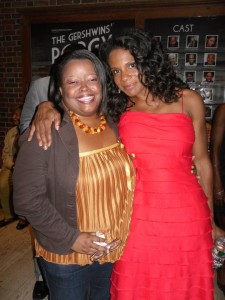
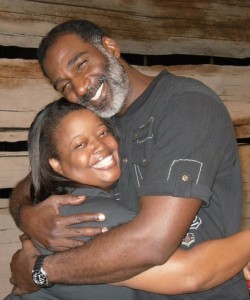
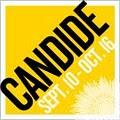 Think of the talent that has brought us the current musical production of
Think of the talent that has brought us the current musical production of 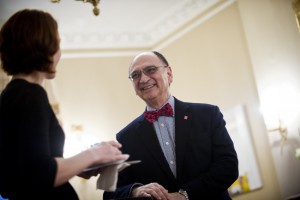
 CFA students will attend events such as "Ellen Banks—Musical Manifestations: Compositions in Wax, Paper, and Yarn" (on view at the Sherman Gallery through October 30) as part of the college's new Freshmen Experience program. Photo by Kalman Zabarsky
CFA students will attend events such as "Ellen Banks—Musical Manifestations: Compositions in Wax, Paper, and Yarn" (on view at the Sherman Gallery through October 30) as part of the college's new Freshmen Experience program. Photo by Kalman Zabarsky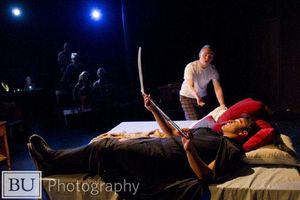 With yesterday’s announcement in
With yesterday’s announcement in 